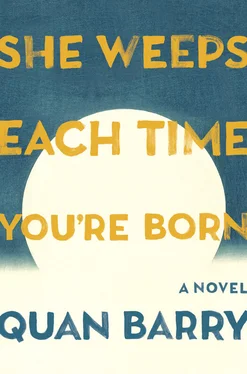Why would you travel on this day of all days, said Linh, offering the woman a chair. The woman didn’t put out her cigarette. She took a long drink, finishing the whole glass at once. Nothing fazes me anymore, she said, setting the glass back down and taking a deep drag, the cigarette suddenly half as long. Not even the death of our lord, asked Linh. Not even, said the woman.
Overhead Son was sitting on the railing of the third-floor balcony, his legs dangling over the edge. It was one of the grandest houses on the street. There were others like it, houses with air-conditioning and western appliances, running water, tile floors, teak furniture. Foreign money flowed in from the overseas Vietnamese who had left years ago. Families who just decades before were peasants now built pastel-colored confections all through the thirty-six streets of Hanoi’s Old Quarter, each house tiered like a wedding cake.
Across the table the baby began to coo. Qui ran her finger along the fontanel at the top of the baby’s head where the bony plates had yet to close. In the lemon tree the female parakeet was still weeping. A single tear rolled off the end of her beak and fell on top of the baby’s head. All her life the baby in Qui’s arms will insist that she can hear voices coming from the trees, though no one will believe her. I do too understand the language of birds, the grown-up baby will tell herself when friends scoff at her assertion. The landscape will be empty except for the pied kestrel sitting in the nearby eucalyptus, the kestrel sympathetically vocalizing klee klee klee, pay them no mind .
In the courtyard the strange woman sat smoking, her shoes lying in her lap. After each inhalation, a thin gray cloud hung on the edge of her upper lip before she fully exhaled. If I tell you what you want to know, said Rabbit, it will cost me everything. Overhead in the lemon tree the female parakeet continued to cry. The woman made no sign that she’d heard what Rabbit had said. And if I don’t help you, Rabbit continued, it will cost me even more. Lightly the woman ran a finger around the rim of her empty glass. She bent over and stubbed her cigarette out on the ground but managed to keep the smoke cycling a few breaths longer, blowing a stream of it out of her mouth and inhaling it back in through her nose.
In the lemon tree the male parakeet fluffed his wings. When Gautama Buddha cut His long princely hair and left the palace of His father, said the male bird to his mate, legend has it Kanthaka, His milk-white horse, openly wept.
Street of Wooden Bowls, Street of Instruments with Strings. Street of Sandals, Rafts, Cotton, Sails. Street of Hemp and Paper. Sweet Potato Street, Street of Tin and Oils. Street of Pickled Fish, Pipes, Sugar, Silversmiths, Street of Baskets and Brushes. Scales. Street of Hats, Fans, Aluminum, Combs. Street of Pipes and Bottles. Street of Thread, of Onions, Mats, Incense, Bricks. Street of Worms, of Shoes, of Silk. Street of Bamboo Screens. Street of Coffins, Medicine, Jars. Street Strewn with Salt .
ON THE STREET OF FANS THE VAN CAME TO A HALT. TWO TOURISTS went running by with their cameras jostling around their necks. Rabbit sank back in her seat. Outside the window the storefronts were cluttered with icons. Since the government had begun modernizing the economy, Hang Quat was rife with religious images, row after row of plaster figurines. There was Quan Am with Her multiple hands, statues of Mary and the Christ child, the baby Jesus with the face of a grown man, Mary’s eyes almond-shaped and heavy-lidded, eastern. The sidewalk in front of one store brimmed with images of the seated Buddha, His earlobes elongated. But who hears the hearer, Rabbit thought.
Then the funeral procession came around the corner. She was surprised to see a band with instruments. Usually a woman’s recorded voice warbled like a bird over a sound system as someone plucked the long strings of the dan bau . Today the musicians walked dressed in matching uniforms. One man was playing a long flute pocked with the markings of an actual bone. The musicians were all white-haired. Young people weren’t interested in learning how to play traditional instruments, though in Vietnam there is a saying: the living need light and the dead need music.
In the van Rabbit could feel Linh’s eyes on her, the child hungry for an answer. Rabbit remembered the day last year when they had woken up to find the parakeets nesting in the tallest of the lemon trees. Linh had stood underneath the bough and pointed. Lady, said the male bird. We have come to serve you. Did you hear that, Rabbit said to Linh. The bird opened its wings and flapped them a few times, the sound grand and majestic as if coming from a much larger creature. Hear what, said Linh.
Rabbit ran her hand down the leather seat. The air-conditioning was on, but Linh had opened a window. Up ahead Rabbit could see a large flatbed truck crawling along behind the musicians. She knew the family would be up at the front. There might be as many as a thousand mourners wailing behind them. On auspicious days the Old Quarter could host up to four funerals before noon. How each one would stop on Hang Giay before the great wooden doors, the closest living relative entering the courtyard and bowing before Rabbit with a pained look in the eye.
All right, Rabbit said. There was a weariness in her voice. Linh slid open the door and scurried out into the crowd.
From the backseat Qui put a hand on Rabbit’s shoulder. I’m okay, said Rabbit. For the past few years she knew what the local people had been saying about her, the rumors that flew about the city, that she herself no longer took earthly food. She was afraid Qui might lift her shirt and pull Rabbit to her pale breast right there in front of the driver and this strange woman who was the sole reason for this trip. In the backseat next to Qui the woman was staring out the window, her jaw working a piece of gum. Yesterday when she had walked into the courtyard, they had learned her name was Tao. Apple . It was difficult to determine the woman’s age, but Rabbit figured she was in her late thirties. And now, less than twenty-four hours after meeting her, they were all in a van headed south to the small hamlet just outside Hue where the woman said it had happened.
When she had held Tao’s hands under the lemon trees, the taste of dirt had welled up in Rabbit’s mouth, her ears stinging. Quickly she pulled her hands away. I have to see where it happened, she’d said. There are so many voices. During the past year her encounters had become more draining. Every time she listened, she became less herself, the dead filling her with their own stories — tales of betrayal, murder, loneliness, and pain. In September it would be ten years since Anne-Marie, the Black Tai lying patiently in the ground waiting for someone to acknowledge them. And the one thing she had never considered as she walked the scrubby earth of Dien Bien Phu that first time long ago was the politics. Which stories the world is eager to bring into the light. Which stories it doesn’t want told.
When Linh came back to the van from the funeral procession, Qui and Tao and the driver climbed out. Linh held the door open and nodded. It was a widower, a young man, his suit white as salt. When his mother tried to climb in after him, Linh shook her head. Rabbit slid the door shut.
The space was so small she didn’t even need to take his hand. His suit and jacket and vest were all the same blinding white. She noticed his tie clip was a small jade figure of the goddess, Her arms posed around Her head like a spider. The clip looked overly smooth from wear. Maybe he thumbed it when he felt nervous. No, it was something else, the ridges of his thumbprint whirling over the goddess’s face, yes, the man thumbing the clip whenever he thought of the one who had given it, his thumb working the small jade figure like a tongue worrying a sore in the mouth.
Читать дальше












